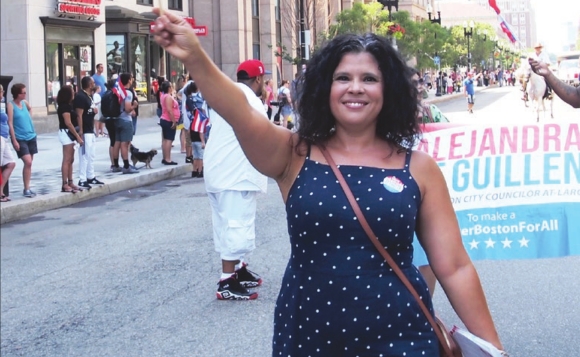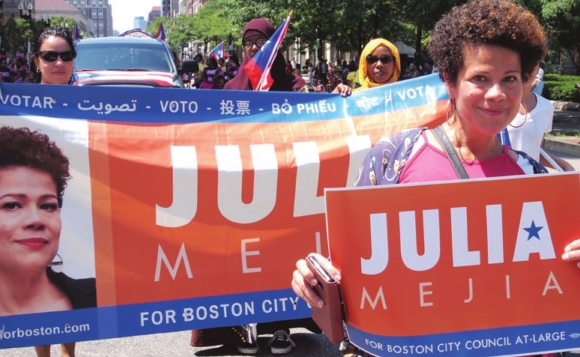
Alejandra St. Guillen marches in the Puerto Rican
parade. St. Guillen was one of three at-large council candidates
endorsed by a coalition of progressive groups.

Veteran community organizer and at-large candidate Julia Mejia marches in the Puerto Rican parade.
Groups advance progressive city agenda
Eight years ago, when Alejandra St. Guillen was executive director of the Latino Political group ¿Oiste?, the choices of which candidates to endorse were often limited to the four people of color on the white-male-dominated Boston City Council.
Now, with six women of color seated on the body and several more black and Latino candidates in contention for open district seats and the four at-large seats ¬— including St. Guillen — the endorsement process for progressive groups has become more complex.
So after filling out a 34-question form proffered by Right to The City Vote and a coalition of groups including Chinese Progressive Community Action, Progressive Massachusetts, Boston Electoral Circle and the immigrant rights group Mijente, St.
Guillen said she was thrilled to receive an endorsement from the coalition, along with fellow atlarge candidates Julia Mejia and David Halbert.
“They have an ambitious agenda,” St. Guillen said. “It’s great to see progressives working with people of color.”
The coalition’s questionnaire included 11 questions on housing, four on environmental justice, six on economic justice and others gauging candidates’ positions on issues including the city’s BuildBPS school building plans, the re-establishment of an elected school committee and the Boston Police Department’s collaboration with federal immigration officials.
“Part
of this is to really see which candidates will take a stand for issues
our communities care about,” said Karen Chen, staff for the Chinese
Progressive Political Action and Right to The City Vote.
The
final endorsement list includes the three at-large candidates as well
as Kenzie Bok, who is running for the District 4 seat being vacated by
Josh Zakim; Ricardo Arroyo, who is running for the District 5 seat being
vacated by Tim McCarthy; and Liz Breadon, running for the District 9
seat being vacated by Mark Ciommo. Halbert is black. St. Guillen, Mejia
and Arroyo are Latino. Bok and Breadon are white.
Growing progressive vote
The coalition that endorsed them represents what St. Guillen identifies as a key geographical feature in Boston’s electoral map.
“There’s
a progressive corridor, from Roxbury to Jamaica Plain to Roslindale and
even into West Roxbury where I live,” she says. “The city is changing.”
In
past decades, white elected officials have relied on the neighborhoods
along the city’s periphery — South Boston, the southern portion of
Dorchester, West Roxbury, Charlestown and East Boston — for the votes
necessary to dominate the city’s political scene. While the 2000 Census
identified people of color as the city’s majority population, candidates
of color still struggled to win citywide office during the following
decade.
In last
year’s electoral season, upset victories by Rachael Rollins in the
Suffolk County District Attorney race and Ayanna Pressley in the race
for the 7th Congressional District seat demonstrated the rising power
voters of color and white progressives voting in neighborhoods at the
center of the city.
St.
Guillen credits last year’s victories by women of color to a coalition
of supporters in the city’s communities of color and the white
progressive communities in Jamaica Plain, Roslindale and, increasingly,
West Roxbury.
Chen agrees. “We learned from the district attorney race, when we were able to win through collaborative effort,” she said.
In
that race, with several candidates of color facing off against former
prosecutor Greg Henning, widely perceived to be the front-runner,
Hennings’ victory seemed almost certain. But progressive white groups
and groups
led by
people of color coalesced around Rachael Rollins’ campaign, Chen said,
helping her to win by a more-than 15,000-vote margin in Boston.
Political
consultant Calvin Feliciano said the organizations are more
representative of the city’s majority people of color population and are
putting their values front and center in the political conversation.
“They’re saying what a lot of people are feeling, that they want to see bold change and are willing to take action,” he said.
New
England United for Justice Executive Director Mimi Ramos notes that the
group intentionally avoided endorsing incumbents, instead focusing on
open seats and the at-large race.
“We’re
really excited about the fresh perspectives people are bringing to the
table,” she said. “We’re supporting Latino candidates and white
progressive candidates willing to stand up for issues. They were the
strongest candidates coming through the process.”
Key issue: housing cost
Right
to The City Vote is the political arm of Right to The City Boston, the
local chapter of a national group focused on housing issues. Several of
the questions the group asked candidates were about rent control, an
issue that in past years has divided councilors of color and white
progressives from the white male majority on the council. While many
incumbent councilors, including Michelle Wu, have come out against rent
control, all six endorsees expressed support for the measure.
“It’s an issue that residents really care about,” Ramos said. “It’s an issue impacting communities across the city.”
“Housing
displacement and gentrification are issues people are facing
nationally,” Chen said. “Boston is the third most expensive city to live
in. Wages are not keeping up with housing costs. In order to adequately
deal with these issues, we need people who understand them through a
racial justice lens.”
Other
issues highlighted in the group’s questionnaire include a $22 minimum
wage for the city, the idea of community-elected boards with
decision-making power over zoning and development in the city and the
elimination of the Boston Police Department’s gang database.